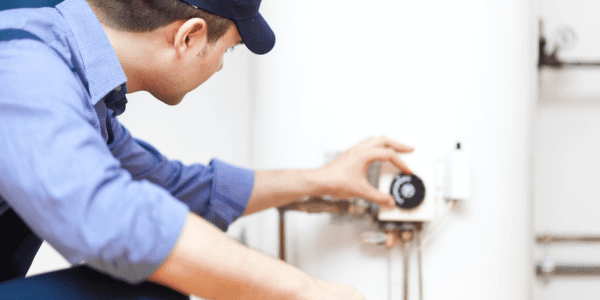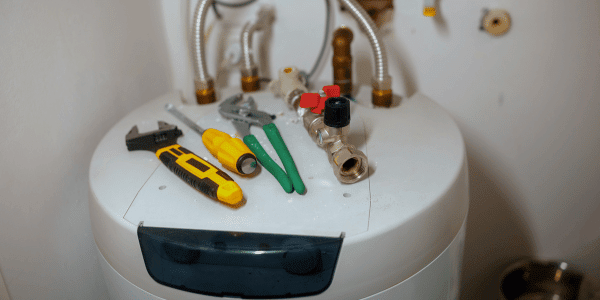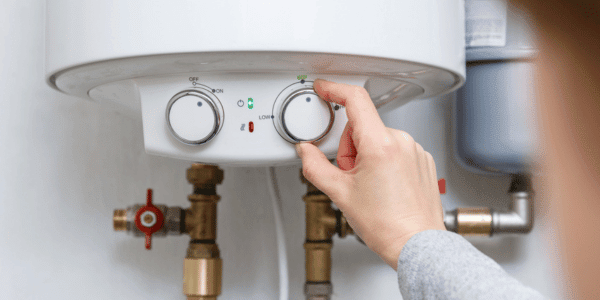Everything You Need to Know About Water Heaters

Water heaters are the unsung heroes of safe, functional homes. They heat and store the water used for showers, baths, washing machines, and more. With so much at stake, having the correct heating unit is essential to household operations. Read this water heater guide to learn about the different types of water heaters, how to choose the right one, and other water heater maintenance tips.
How Do Water Heaters Work?
Most water heaters are large metal storage tanks that are usually found in your laundry room, garage, or utility closet. These tanks hold significant amounts of water and use gas or electricity to heat a portion of the stored water as needed. Electric water heaters have a heating element installed to raise the water temperature. Gas water heaters have a flame burning underneath the tank to warm the water like on a stove. Here’s the process of how water heaters work:
- Water goes into the water heater from your main supply.
- The water is heated at the bottom of the tank by the flame or heating element.
- The hot water rises to the top of the tank and is delivered through the hot water supply pipes to your faucet.
The Different Types of Water Heaters
While storage tank units are the norm, they aren’t the only types of water heaters on the market. Homeowners can choose from a few different types of water heaters, including:
Tank Water Heater
The standard units, tank water heaters use a storage tank with enough hot water for everyday use. Due to the limited amount of water held, they have the potential to be overworked in larger, more demanding households.
Tankless Water Heater
As their name suggests, tankless water heaters operate without a storage component. Instead, they heat your hot water supply directly, giving you the heated water you need regardless of demand. They’re typically much smaller than tank heaters but have higher installation costs.
Heat Pump Water Heater
Also known as hybrid water heaters, these units offer homeowners a more efficient, cost-saving model that pulls heat from the air instead of generating it. Because of their eco-friendliness, they’re usually eligible for rebates and tax incentives.
Solar Water Heater
Just like solar panels, solar water heaters use the sun's heat to get the job done, with an active or passive heating system. Active systems have pumps and controls that move the water into your home, while passive systems flow naturally into plumbing systems.
RELATED: Changes For a More Eco-Friendly Home
What Size Water Heater Do I Need?
The size of your water heater directly relates to your household occupancy and usage. Here are some general rules of thumb:
- 1-2 people need 30-40 gallons
- 2-3 people need 40-50 gallons
- 3-4 people need 50-60 gallons
- 5+ people need 60-80 gallons
How Much Do Water Heaters Cost?
The cost of your water heater comes down to the type of unit you want to buy. Here’s the budget breakdown for each kind of water heater:
- Tank water heater: $1,500-$2,500
- Tankless water heater: $2,500-$5,500
- Heat pump water heater: $2,500-$5,000
- Solar water heater: $3,000-$9,000
These estimates include the costs for installation, permits, warranties, and removal of old units. However, features, like energy-efficient options, can also raise prices.
In addition to these costs, consider the expected expenses for water heater repair and operations. The Federal Trade Commission (FTC) requires water heaters to have an EnergyGuide label, explaining energy efficiency and running costs in detail.
How Long Do Water Heaters Last?
Water heaters have a shelf life, and eventually, you’ll have to replace the unit. Tank water heaters should last at least six years, with some units working well for over a decade. Tankless water heaters can last for more than 20 years. No matter what type of water heater you own, check your unit’s warranty for a better estimate.

How Do You Repair a Water Heater?
Some of the most common issues with water heaters are water leaks and improper heating. While water heater repairs are inevitable, most issues can be solved with the right tools and labor. Here are solutions if your water heater is:
- Not running. Check for a tripped circuit breaker in your unit’s service panel or turn off the power in your service panel and reset the high-temperature limit behind the access panel.
- Not providing enough hot water. If hot water comes out in low volumes, call a professional, but lukewarm water at normal volume usually means you need to flush your water heater and refill it to eliminate sediment buildup.
- Making water too hot. Turn off the power to the water heater, remove the access panel, and check that the thermostats on your unit are set no higher than 120 degrees Fahrenheit.
- Leaking hot water. Tighten the leaking outlet pipe with a wrench.
- Making too much noise. This is usually due to overheated sediment boiling in the unit. It’ll need to be drained.
When in doubt, seek the help of water heater repair services in your area.
Related: When to DIY vs. When to Hire a Pro
How to Drain a Water Heater
For noisy water heaters and inadequate heating, you’ll have to drain your water heater to get things back to normal. Follow these steps to empty and refill your tank:
- Turn off the water and power supply to your water heater.
- Attach a garden hose to the valve at the bottom of the heater and place the other end outside or over a flood drain
- Open the water heater’s temperature pressure relief and drain valves.
- Let all the water and sediment empty out.
- Close the two valves you opened and remove the hose.
- Turn the water and power supplies back on.
More Major Maintenance
Buying a new hot water heater is a great way to upgrade your home, and it's especially important if you’re considering selling. Offering buyers new, fully functional appliances and systems is a great way to boost your sale price and deliver what they’re looking for. Read “8 Essential Home Fixes to Boost Your Sale Price Before Listing” for more details.
Water Heater FAQs
How long do water heaters typically last?
Traditional water heaters typically last six to 12 years, while tankless models can last 15-20 years with proper maintenance.
How much should it cost to change a hot water heater?
Water heater replacement, on average, costs more than $1,300, with the exact price depending on the model type, the water heater’s size, and labor charges.
How often should I flush my water heater?
Flush your water heater once a year to remove mineral and sediment buildup, improve efficiency, and prolong the water heater’s life.
How do you know a water heater is going bad?
A lack of hot water, leaking water, discolored water, foul-smelling water, and a noisy unit are all signs of a bad water heater that needs repair or replacement.
